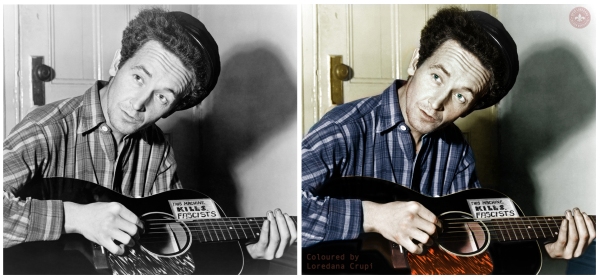Day 149 of Colourisation Project – October 3
Challenge: to publish daily a colourised photo that has some significance around the day of publication.
On this day, October 3, 1967, Woody Guthrie, the godfather of the 1950’s folk revival movement died at the age of 55.
Some say there wouldn’t be American music without Woody Guthrie. Bob Dylan called him “the true voice of the American spirit.” In 1981 John Steinbeck, American Pulitzer Prize and Nobel Prize winning author described him thus;
“Woody is just Woody. Thousands of people do not know he has any other name. He is just a voice and a guitar. He sings the songs of a people and I suspect that he is, in a way, that people. Harsh voiced and nasal, his guitar hanging like a tire iron on a rusty rim, there is nothing sweet about Woody, and there is nothing sweet about the songs he sings. But there is something more important for those who will listen. There is the will of a people to endure and fight against oppression. I think we call this the American spirit.”
Guthrie was an accomplished, self-taught musician, whose work provided a new template for contemporary folk music by fusing long held American musical traditions with left-wing populism and anti-elitist rhetoric. The sign on his guitar summed it up. “This Machine Kills Fascists.”
Guthrie wrote hundreds of songs, including such revered classics as Pretty Boy Floyd, Pastures of Plenty, Hard Travelin’, Deportees, Roll On Columbia, Vigilante Man and This Land Is Your Land, have all become staples in the canon of American music.
The celebratory song that many Americans consider the true national anthem of the USA, This Land Is Your Land, was written in 1940 and first recorded in 1944. It was written in anger, as a critical response to Irving Berlin’s God Bless America, a song which Guthrie loathed and considered “unrealistic and complacent.” Guthrie altered the lyrics over time, sometimes including more overtly political verses in line with his communist sympathies.
Guthrie, a native of Oklahoma, was generally associated with the economically deprived working class and those displaced by the great dust storms of the 1930s. The “Dustbowl Balladeer” as he was often referred to used his music as a weapon in attacking the political injustices in the American economic system, and in supporting the rights of workers, immigrants and those on the margins of society.
Sadly, Guthrie spent the last 12 years of his life in and out of hospitals and psychiatric wards suffering from Huntington’s chorea, a genetic disorder that affected not only his health but his mind, and one which also killed his mother.
At the time of his death in 1967, Guthrie had already begun to assume legendary stature as a folk figure, and his influence was immense. His legacy is the groundwork not only for the great folk revival of the 1950s and 60s, but also for the iconoclastic scions of that movement such as Bob Dylan, Joan Baez and Bruce Springsteen.
A great testament to his legacy came from Pete Seeger in 1964, three years before Guthrie’s death when he wrote: “I think that, of Woody’s thousands of songs and verses, quite a large number are going to outlive this century, and this is a rare thing for a songwriter. …I think maybe several dozen of Woody’s songs are going to be sung by my grandchildren and their grandchildren. What better kind of immortality could a man have?”
And on that note I leave you with a clip of some rare 1947 footage of Woody Guthrie from Pete Seeger’s To Hear Your Banjo Play.
______________________________________________________________
“I never did make up many songs about the cow trails or the moon skipping through the sky, but at first it was funny songs of what’s all wrong, and how it turned out good or bad. Then I got a little braver and made up songs telling what I thought was wrong and how to make it right, songs that said what everybody in the country was thinking.” – Woody Guthrie


Loredana, thanks for the wonderful education. I knew nothing about Guthrie, except his name, and was surprised to learn the genesis of “This Land is Your Land.”
LikeLike
Thankyou Stacy. We’re always learning something! I didn’t know Guthrie loathed God Bless America! 🙂
LikeLike